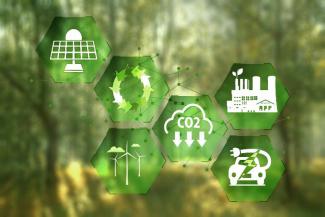NETL’s expertise in geo-data science and computational data management and virtualization has supported the development and deployment of a web-based platform to connect entities that generate carbon dioxide (CO2) with the technology and commercial sectors that offer capabilities to reduce greenhouse gas emissions.
"The Carbon Matchmaker, developed by the U.S. Department of Energy’s (DOE) Office of Fossil Energy and Carbon Management (FECM), is an online tool to build strong public-private partnerships and connect carbon management teams across the country,” said Kelly Rose, Ph.D., a geo-data scientist and technical director for NETL’s Science-based Artificial Intelligence/Machine Learning Institute (SAMI)
The Carbon Matchmaker aligns with goals and initiatives included in the Bipartisan Infrastructure Law (BIL), which directs more than $12 billion for carbon management research, development and demonstration over the next five years. The tool's design promotes the formation of teams to support geographically diverse carbon capture, utilization and storage (CCUS) and CO2 removal projects across the United States.
“Perhaps you work in an industry such as energy production using fossil fuels, cement production or steel manufacturing, all of which generate significant levels of CO2. You are preparing to take steps to reduce carbon emissions, but you have no clear plan about how to capture and store the carbon emitted by your operation, how to transport it to the storage site or who can use it as a feedstock for value-added products,” said Paige Morkner, a geologist at NETL who conducts research in big data curation, open data aggregation, and data informatics and visualization.
“Carbon Matchmaker can connect you with public and private entities within your region who are developing or plan to develop projects to address those or similar issues and build regional carbon management teams,” said NETL’s Jen Bauer, lead developer of the Matchmaker tool.
Bauer, Morkner and other NETL researchers have worked closely with FECM to develop an online form to gather detailed information about carbon management projects. The form enables entities launching carbon capture projects, developers of subsurface reservoirs that store carbon and other carbon stakeholders to self-report information about the types of CCUS activities they are currently engaged in or those they will be engaged in during the next few years.
For example, carbon emitters are asked to list how many metric tons of carbon they currently generate annually and projected annual carbon emission levels in the future, as well as the technology readiness levels of their carbon mitigation plans and whether they anticipate using sorbents, solvents, membranes or other technologies to capture carbon.
The form also asks them to provide details about carbon storage plans, such as injection into underground storage reservoirs, their CO2 transport needs and the status of efforts to obtain required permits.
Once this data is reviewed and approved, it will be integrated into the interactive web map on the Carbon Matchmaker website so those using the tool can locate resources and form teams to address carbon management issues in their regions,” Rose said.
The map will show geographically diverse carbon capture and carbon removal projects in the United States, which will enable carbon management teams to connect quickly and align their potential needs in specific geographic areas and help the nation meet its goals for net-zero carbon emissions in the power sector by 2035 and the broader economy by 2050.
The Carbon Matchmaker map is under continuous development. Further changes may be made to improve functionality and user experience. Email edxgeodata@netl.doe.gov to suggest specific improvements.
This NETL-FECM collaboration is part of an ongoing compliance upgrade and overhaul of NETL-FECM’s Energy Data eXchange (EDX) geospatial virtualization, research and development and collaboration capabilities.
NETL’s Science-based Artificial Intelligence and Machine Learning Institute (SAMI)combines the strengths of the Lab’s energy computational scientists, data scientists and subject matter experts with strategic academic and industry partners to drive solutions to today’s energy challenges. For more information on SAMI, visit our home page or contact us directly. Subscribe to SAMI’s biweekly Ai4AE (Artificial Intelligence for Applied Energy) Update and stay apprised of AI/ML news and advancements across NETL and DOE FECM, government, academia and industry.
NETL is a U.S. Department of Energy national laboratory that drives innovation and delivers technological solutions for an environmentally sustainable and prosperous energy future. By leveraging its world-class talent and research facilities, NETL is ensuring affordable, abundant and reliable energy that drives a robust economy and national security, while developing technologies to manage carbon across the full life cycle, enabling environmental sustainability for all Americans.




